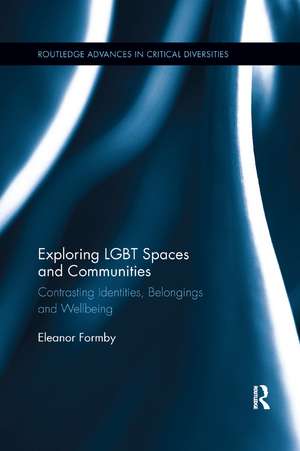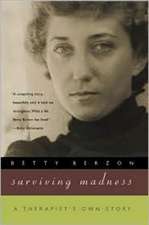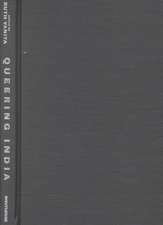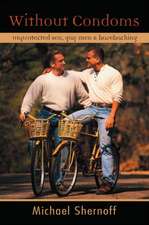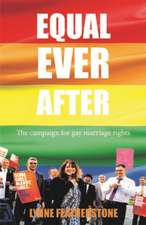Exploring LGBT Spaces and Communities: Contrasting Identities, Belongings and Wellbeing: Routledge Advances in Critical Diversities
Autor Eleanor Formbyen Limba Engleză Paperback – 17 iun 2019
Examining ideas about community ‘ownership’; ‘difference’ and diversity; relational practices within and beyond physical spaces; imagined communities and belongings; the importance of ‘ritual’ spaces and symbols, and consequences for wellbeing, the book foregrounds the lived experience of LGBT people to offer a broad analysis of commonalities and divergences in relation to LGBT identities.
Drawing on an interdisciplinary perspective grounded in international social science research, the book will appeal to students and scholars with interests in sexual and/or gender identities in the fields of community studies, cultural studies, gender studies, geography, leisure studies, politics, psychology, sexuality studies, social policy, social work, socio-legal studies, and sociology. The book also offers implications for practice, suitable for policy-maker, practitioner, and activist audiences, as well as those with a more personal interest.
| Toate formatele și edițiile | Preț | Express |
|---|---|---|
| Paperback (1) | 416.22 lei 6-8 săpt. | |
| Taylor & Francis – 17 iun 2019 | 416.22 lei 6-8 săpt. | |
| Hardback (1) | 1000.27 lei 6-8 săpt. | |
| Taylor & Francis – 27 iun 2017 | 1000.27 lei 6-8 săpt. |
Din seria Routledge Advances in Critical Diversities
-
 Preț: 282.41 lei
Preț: 282.41 lei -
 Preț: 279.99 lei
Preț: 279.99 lei -
 Preț: 310.18 lei
Preț: 310.18 lei -
 Preț: 309.79 lei
Preț: 309.79 lei -
 Preț: 287.61 lei
Preț: 287.61 lei - 16%
 Preț: 276.49 lei
Preț: 276.49 lei - 17%
 Preț: 272.43 lei
Preț: 272.43 lei - 16%
 Preț: 241.15 lei
Preț: 241.15 lei - 26%
 Preț: 820.71 lei
Preț: 820.71 lei -
 Preț: 389.38 lei
Preț: 389.38 lei - 17%
 Preț: 270.41 lei
Preț: 270.41 lei - 13%
 Preț: 324.02 lei
Preț: 324.02 lei -
 Preț: 389.66 lei
Preț: 389.66 lei -
 Preț: 390.80 lei
Preț: 390.80 lei - 5%
 Preț: 370.18 lei
Preț: 370.18 lei - 17%
 Preț: 259.98 lei
Preț: 259.98 lei -
 Preț: 310.18 lei
Preț: 310.18 lei - 17%
 Preț: 259.98 lei
Preț: 259.98 lei - 9%
 Preț: 935.97 lei
Preț: 935.97 lei - 23%
 Preț: 238.56 lei
Preț: 238.56 lei
Preț: 416.22 lei
Nou
Puncte Express: 624
Preț estimativ în valută:
79.65€ • 82.29$ • 66.29£
79.65€ • 82.29$ • 66.29£
Carte tipărită la comandă
Livrare economică 25 martie-08 aprilie
Preluare comenzi: 021 569.72.76
Specificații
ISBN-13: 9780367348106
ISBN-10: 0367348101
Pagini: 228
Dimensiuni: 156 x 234 x 15 mm
Greutate: 0.45 kg
Ediția:1
Editura: Taylor & Francis
Colecția Routledge
Seria Routledge Advances in Critical Diversities
Locul publicării:Oxford, United Kingdom
ISBN-10: 0367348101
Pagini: 228
Dimensiuni: 156 x 234 x 15 mm
Greutate: 0.45 kg
Ediția:1
Editura: Taylor & Francis
Colecția Routledge
Seria Routledge Advances in Critical Diversities
Locul publicării:Oxford, United Kingdom
Public țintă
Postgraduate and UndergraduateCuprins
- Introduction
Cultural communities and practices
Imagined communities and the ‘gay imaginary’
Friendships and personal communities
Virtual communities and cyberian mailways
Community is here to stay?
The research
The book
References
2. ‘Owning’ and questioning LGBT communities
- Introduction
The acronym that ‘lumps together’
‘Managing’ the acronym
Ambivalence
Commonality
Agency
Chapter summary
References
3. Diversity, inequality and prejudice amongst LGBT people
- Introduction
Overview of existing literature
Diversity and inequality
Identity-based prejudice
Faith and religion
Parenting
(Non)conformity
Chapter summary
References
Introduction
Overview of existing literature
Socialising, friendship and seeking intimacy
Friendship families
Safety in numbers
Accessing ‘safe’ spaces
Self-censorship
Activism
Lived experience across the life course
Chapter summary
References
5. Relationships to, within and beyond physical spaces
Introduction
Overview of existing literature
Physical space and geographical areas
Relocation
Rural living
Travel and tourism
Groups and services
Online spaces and virtual communities
Chapter summary
References
6. The pleasures and pains of scene spaces
Introduction
Overview of existing literature
The scene as ‘community’
Positive experiences
Scene exclusions
Invasion, choice and ownership
Chapter summary
References
7. Pride spaces, rituals and symbols
Introduction
Overview of existing literature
Creating communities?
Safety and freedom
Celebration
Protest
Partying with politics
Commercialism
Alcohol at Pride events
Exclusion
‘Excess’ and ‘extreme’ displays of pride
Chapter summary
References
8. Imagined communities and a sense of belonging
Introduction
Overview of existing literature
Belonging and connection
Commonalities, similarities, and mutual understanding
Differences and values
Shared experiences and the ‘bond’ of discrimination?
Chapter summary
References
9. Consequences for wellbeing
Introduction
Overview of existing literature
Impacts on physical and mental health
Seeking support
Friendships, confidence and self-esteem
Finding people ‘like me’
Alcohol, drugs and sex on the scene
Paradoxical spaces
Chapter summary
References
10. Conclusions and implications
References
Appendix: Research methods and participants
Research process and recruitment
Online survey
Interviews and group discussions
Participants
References
Recenzii
This important work, critically approaches a vexed topic that of ‘community’ in an informed, innovative and rigorous way. Its cross disciplinary approach and clear writing style means that it will be of interest to all who are interested and work with not only lesbian, gay, bisexual and trans communities, but also those who are interested in social cohesion, identities, exclusions and marginalisations. This is also a must read for policy makers and the LGBT community and voluntary sector.
Katherine Browne, Professor Human Geography at University of Brighton, UK
Exploring LGBT Spaces and Communities interrogates the complexities that lurk behind the deceptively simple idea of "community." Page after page, Eleanor Formby shatters the stereotype of singularity and shows us the manifold experiences of communities—in the plural—for LGBT people. This book is sure to poke and provoke as it traverses tensions between sameness and difference, hostility from the outside and safe spaces within, forced labels that misalign with lived experiences, on-line and offline encounters, cynicism and celebration about membership, demanding conformity or celebrating individuality, and in broad strokes, whether sexuality is primary or peripheral in our lives.
Amin Ghaziani, University of British Columbia, Canada
This book will be a valuable addition to any undergraduate or postgraduate course of study that includes issues of sexuality, identity, community, (mental) health and wellbeing. It makes no apology about the complexities that the data unfolds and provides meticulous attention to the detail of people’s experiences and intersectional identities. Overall, the book explores the many ways in which ‘LGBT community’ – awkward, inadequate, limited, sometimes oppressive, discriminatory, hostile and exclusive – is aspired to (and is often a [temporary] reality).
Catherine Donovan, University of Sunderland, UK
The take-away message of this book is that although we may talk about ‘the LGBT community’ it may make more sense to talk about a plurality of LGBT communities, as the mainstream ‘LGBT community’ may be unhomely, unwelcoming and discriminatory to some LGBT people.
Diane Richardson, Sage
Katherine Browne, Professor Human Geography at University of Brighton, UK
Exploring LGBT Spaces and Communities interrogates the complexities that lurk behind the deceptively simple idea of "community." Page after page, Eleanor Formby shatters the stereotype of singularity and shows us the manifold experiences of communities—in the plural—for LGBT people. This book is sure to poke and provoke as it traverses tensions between sameness and difference, hostility from the outside and safe spaces within, forced labels that misalign with lived experiences, on-line and offline encounters, cynicism and celebration about membership, demanding conformity or celebrating individuality, and in broad strokes, whether sexuality is primary or peripheral in our lives.
Amin Ghaziani, University of British Columbia, Canada
This book will be a valuable addition to any undergraduate or postgraduate course of study that includes issues of sexuality, identity, community, (mental) health and wellbeing. It makes no apology about the complexities that the data unfolds and provides meticulous attention to the detail of people’s experiences and intersectional identities. Overall, the book explores the many ways in which ‘LGBT community’ – awkward, inadequate, limited, sometimes oppressive, discriminatory, hostile and exclusive – is aspired to (and is often a [temporary] reality).
Catherine Donovan, University of Sunderland, UK
The take-away message of this book is that although we may talk about ‘the LGBT community’ it may make more sense to talk about a plurality of LGBT communities, as the mainstream ‘LGBT community’ may be unhomely, unwelcoming and discriminatory to some LGBT people.
Diane Richardson, Sage
Descriere
The phrase ‘LGBT community’ is often used by policy-makers, service providers, and lesbian, gay, bisexual and trans people themselves, but what does it mean? What understandings and experiences does that term suggest, and ignore?
